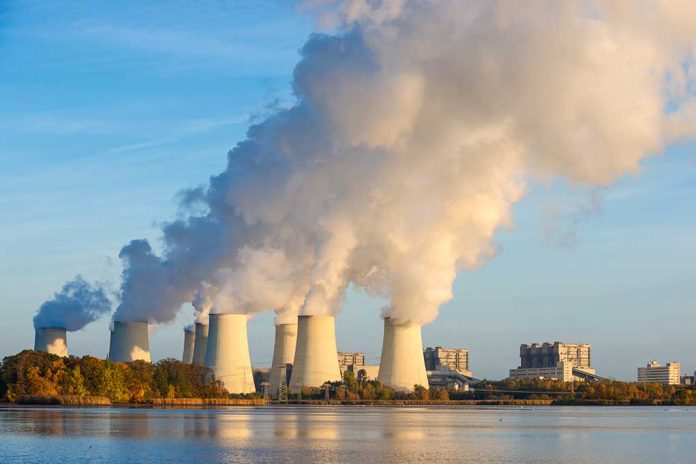
The Republican Party is championing nuclear energy and natural gas as solutions to counter the Green New Deal, positioning these sources against environmental policies they deem restrictive to both economic growth and American energy independence.
At a Glance
- Republicans advocate for nuclear energy and natural gas as cost-effective climate solutions
- The GOP criticizes the Green New Deal and Paris Climate Accord as harmful to U.S. interests
- President-elect Trump’s energy plan focuses on American resources and energy independence
- Conservative leaders support expanding nuclear, solar, and wind energy alongside natural gas
Republican Energy Strategy: A Focus on Nuclear and Natural Gas
The Republican Party is advancing a comprehensive energy strategy that emphasizes nuclear power and natural gas as cornerstone solutions to address climate change while promoting economic growth. This approach stands in stark contrast to Democratic initiatives like the Green New Deal and continued support for the Paris Climate Accord.
Former Republican Congressman Doug Collins has emerged as a vocal proponent of nuclear energy and hydrogen fuel, positioning these technologies as viable and efficient climate solutions. Collins, along with other conservatives, argues that these energy sources can provide reliable power while reducing emissions, without the economic drawbacks they associate with more aggressive environmental policies.
⚛️Nuclear is the biggest winner in the latest @IEA World Energy Outlook report
Since last year's report, the IEA's net zero emission scenario has increased the 2050 need for nuclear by 16% pic.twitter.com/z2tHzvYPBZ
— Richard Ollington (@RichardOllingtn) October 17, 2024
Criticism of International Climate Agreements
A key component of the Republican energy strategy involves criticizing international climate agreements, particularly the Paris Climate Accord. Collins and his colleagues contend that such agreements place an unfair burden on the United States while allowing countries like China to operate with fewer restrictions. This sentiment echoes president-elect Trump’s fulfilled promise to withdraw the U.S. from the Paris Agreement, citing concerns about its impact on American industry and jobs.
Republicans argue that natural gas presents a cleaner and more readily available energy option compared to traditional fossil fuels. They view it as a bridge fuel that can help reduce emissions in the short term while other technologies are developed and scaled up. This stance aligns with their broader goal of achieving energy independence while maintaining economic competitiveness.
Trump’s Energy Independence Plan
Former President Trump’s energy plan, which has garnered support from Republican leaders like North Dakota Governor Doug Burgum, focuses on ending what they term the “war on energy” by reducing regulations and taxes on energy production. The plan emphasizes utilizing American energy resources to their fullest extent, with the stated goals of making American energy the most affordable globally, reducing inflation, and creating jobs.
This approach reflects a broader Republican strategy to prioritize energy solutions that they believe will bolster national security and stimulate economic growth. By focusing on domestic energy production, including nuclear and natural gas, Republicans aim to reduce dependence on foreign energy sources and create a more resilient energy infrastructure.
A Diverse Approach to Clean Energy
While the Republican strategy largely focuses on nuclear energy and natural gas, some conservative voices are advocating for a more diverse approach to clean energy. Benji Backer of the American Conservation Coalition, for instance, supports expanding nuclear, solar, and wind energy alongside traditional fossil fuels. This perspective suggests a growing recognition within conservative circles of the need for a multifaceted approach to energy policy that balances environmental concerns with economic priorities.
As the debate over America’s energy future continues, the Republican Party’s emphasis on nuclear energy and natural gas presents a clear alternative to Democratic proposals. This strategy reflects the GOP’s broader philosophy of promoting energy independence, economic growth, and national security while addressing environmental concerns through market-driven solutions and technological innovation.






















